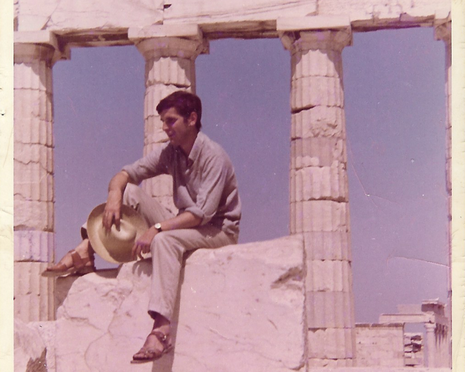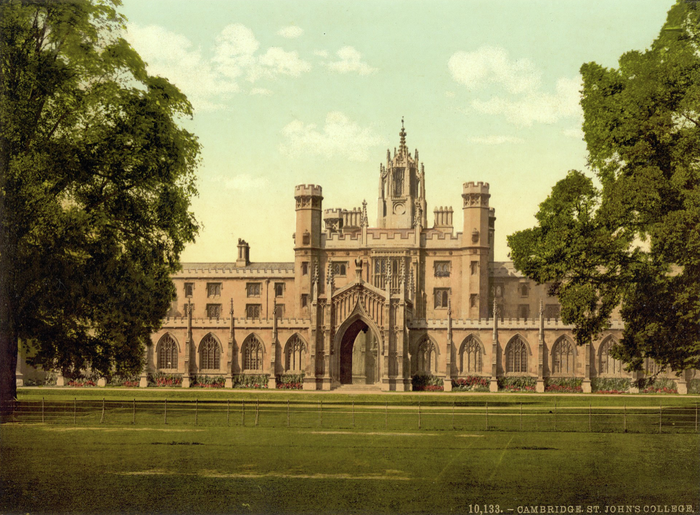From Burley to Cambridge: the story of Ken Lickley
Reuben Baldwin tells the story of his grandfather at King’s in the 1960s

From the earlier years of my life, my plans have been firmly embedded in the halls of Cambridge. I remember, when I was about ten, being determined to reach Cambridge to study History. But this motivation wasn’t my own invention. Instead, it was imprinted on me by stories of my maternal grandfather, Ken Lickley, who studied Mathematics at King’s College in the mid-late 1960s. In a time where the social make-up of Cambridge was much narrower than today, his presence was pathbreaking.
This story isn’t entirely mine to tell. I never met my grandfather. Everything I know about him is relayed through my grandmother, who met him in Cambridge, and my mother. But this is a story that resonates for regional students like myself, and so must be retold.
Ken grew up in Burley in Wharfedale, a village with a textile mill in West Yorkshire. I would like to say that, in those days, the dialects were stronger and the people didn’t move far, but as particular as Burley may have seemed, it was still attached to the great, dynamic cities of Bradford and Leeds. While people would cycle for hours in the countryside after work, this was no rural idyll.
“Ken got stuck into the rituals and games of the Cambridge student”
It must be emphasised that Burley was no parochial stronghold of the hoary tropes of old Yorkshire. After all, like me, Ken did not wake up with the sudden inspiration to go for Cambridge. He was a gifted student, but the academic environment of Ilkley Grammar School (coincidentally my alma mater) played a part. Chiefly, the accomplishments of Sir Alec Clegg, Chief Education Officer in the West Riding at the time, were instrumental in getting working-class people to university. Exciting strides were being made in education, and my grandfather was in prime position to gain from them.
This advantage was evident as soon as he matriculated at King’s College in 1967. It is true that his black tie was second-hand, his cricket whites passed on by his uncle, but my grandmother says “He adapted terribly well.” Before he was at Cambridge, he liked classical music – particularly Mahler. He composed poetry and relished in Shakespeare. His interest in the arts was by no means put on. One of his most striking qualities was the variety of his interests: a mathematician, a science-fiction reader, a sportsman. He rowed, played with the College rugby team.
Nevertheless, he reckoned with social difference. “I can remember him changing the way he spoke going home,” says my grandmother. I am told that ladies at the bus stop used to tell him that he was going above himself. He also worked the mills for hours, checking the fabric on a rolling machine for flaws. I am told that he would take toilet breaks and stare at the toilet paper wondering if it would start to unravel. For all that, at the time there were plenty of people like him at Cambridge. Accent identified, but young people were adaptable and could lark about with each other. Ken got stuck into the rituals and games of the Cambridge student.
But the cultural capital he acquired at Cambridge was no source of pretension. After teaching at the private Trinity School in Croydon, he returned north to the mining town of Armthorpe near Doncaster, where he taught at a state school out of principle. My grandmother experienced something of a culture shock. But Ken combined the culture he had enjoyed at Cambridge with his experiences at home. He got his students. He didn’t see his students as problems to be cracked. His attitude resonated with that of Sir Alec Clegg, who said “encouragement is far more important than punishment.” He carried this ethic with him through teaching posts at Northampton, Derby, and finally as headteacher at Eccleshill Upper School, whereupon he brought his family within a stone’s throw of his starting point: Ilkley, the town up-valley of Burley in Wharfedale.
Through a confluence of accidents, I was raised in this town of Ilkley. I was taught at Ilkley Grammar School. I made my way to Cambridge, although in a different subject and college. But the resonances between my story and my grandfather’s are significant. I never knew Ken Lickley. But the Granddad Lickley of memory has been an influential archetype in my life. His story encourages us to exercise whatever gains we make in our studies here in an honest way. Cambridge is no silver bullet for social inequality. My grandfather was himself a beneficiary of the notorious tripartite school system, which sorted eleven-year-olds on the basis of a myth of innate intelligence. But he was never attached to these delusions of superiority and inferiority. Instead, he remembered who got him to Cambridge, what assets were mobilised, and decided to offer something in return.
 Features / Should I stay or should I go? Cambridge students and alumni reflect on how their memories stay with them15 December 2025
Features / Should I stay or should I go? Cambridge students and alumni reflect on how their memories stay with them15 December 2025 News / Cambridge study finds students learn better with notes than AI13 December 2025
News / Cambridge study finds students learn better with notes than AI13 December 2025 News / Uni Scout and Guide Club affirms trans inclusion 12 December 2025
News / Uni Scout and Guide Club affirms trans inclusion 12 December 2025 Comment / The magic of an eight-week term15 December 2025
Comment / The magic of an eight-week term15 December 2025 News / News In Brief: Michaelmas marriages, monogamous mammals, and messaging manipulation15 December 2025
News / News In Brief: Michaelmas marriages, monogamous mammals, and messaging manipulation15 December 2025








